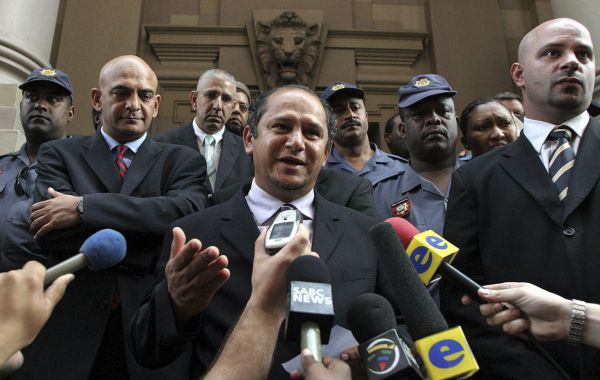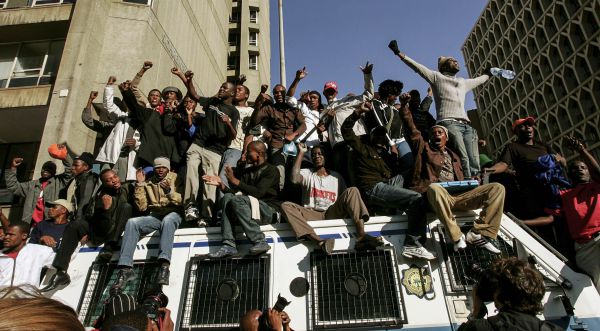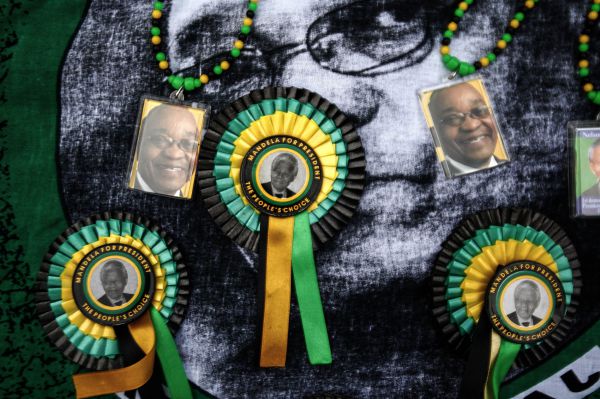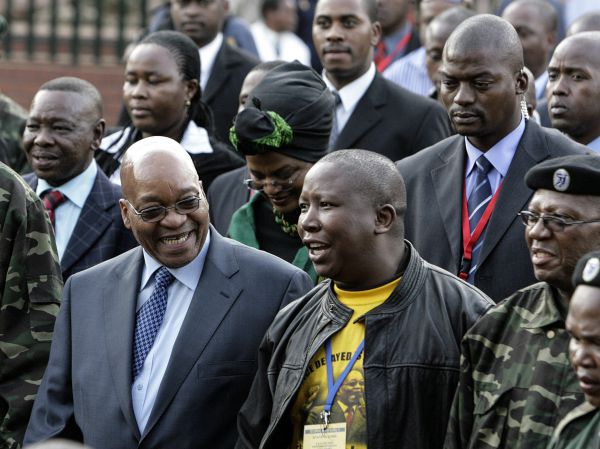Jacob Zuma once seemed invincible
Former president Jacob Zuma’s rambling monologue on the SABC on Wednesday afternoon wasn’t just an arrogant, delusional act of defiance in the face of the ANC’s national executive committee (NEC) instruction to step down as head of state.
It was his final act of working outside the structures of the governing party, and of the state, and of using the resources that his deployment to government had enabled him to pursue his own agenda, often to the detriment of both. It was behaviour that over his decade in power had become pathological.
Hours before Zuma finally acquiesced to his party’s demands and resigned, his appearance on the national broadcaster was the instinctive act of a man who found himself in a corner. When he eventually did go public, it was outside of government and party information systems.
By threatening the ANC with the consequences of its “rush” to get rid of him, he was again reaching out to the parallel world and shadow structures that he has long nurtured, even before he took control of the party presidency in 2007 — the “Big Men” of the Southern African Development Community and African Union, his “friends” in Brics (Brazil, Russia, India, China, South Africa), businesspeople and everyman who he believed supported him and his cohort of spies and police officials working in the shadows.
Zuma claimed he was disagreeing with and not defying the ANC and its parliamentary caucus, which, on Wednesday morning, had announced its intention to back the Economic Freedom Fighters’ (EFF) motion of no-confidence should he not resign by the end of the day.
When he did resign a little over an hour before midnight, he again reiterated his disagreement with the ANC’s decision — and even at the end, he still had regarded himself, and not the ANC, as the “centre”.
Often at the rallies that preceded the ANC’s 2007 elective conference in Polokwane, Zuma presented himself to crowds as the custodian of the party’s values and traditions. And, on St Valentine’s Day in 2018, he saw himself, if not as the embodiment of the ANC, then certainly someone above it.
In the days before his resignation, Zuma was playing the last cards of a hand he had dealt himself in 2005, when he was arrested and charged with corruption and money-laundering in connection with the R1.38-million in bribes he had received from Nkobi Holding boss Schabir Shaik. Shaik was jailed for the payments made to Zuma for a series of interventions on his behalf while Zuma was KwaZulu-Natal economic affairs MEC. Zuma was a close comrade of Shaik’s activist brothers.
The crude access-for-cash deal between Zuma and Shaik was the primitive forerunner of the elaborate network of state capture created by Zuma and the Gupta family, which former public protector Thuli Madonsela would expose in her State of Capture report.

[Jacob Zuma once seemed invincible, even in the turbulent years that saw him being fired as deputy president by Thabo Mbeki after Schabir Shaik’s conviction in 2005 (above) (Alexander Joe/Reuters) and acquitted on rape charges in 2006 (below) (Mike Hutchings/Reuters)]

By the end of Zuma’s venal years in Mahlamba Ndlopfu, his official residence in Pretoria, this was the most explicit example of an alternate state created by a president. The Gupta brothers cast for prospective Cabinet ministers, profited rapaciously from the state and diverted development funds for an ostentatious wedding.
When Zuma was fired as deputy president by Thabo Mbeki in 2005, he reached out to his supporters in and outside of the ANC. Court appearances were turned into what was to become a campaign for the ANC presidency. Relationships with the “coalition of the wounded” in the tripartite alliance, traditional leaders and the business community were exploited to build the “Zunami” of support that was to sweep him into office. Organisations like the Friends of Jacob Zuma Trust sprung up as business and political friends raised funds for his defence and platforms from which to fight for his political survival. He hogged the main billing at every ANC event he could.
They expected payback.
At the time, the ANC’s internecine war between personalities and over policies was causing comrades to attack each other. In 2007, then ANC chairperson Mosiuoa Lekota told the Mail & Guardian the warring Zuma and Mbeki had once been as close as “tongue and saliva”. But they were fighting, and were using the state security apparatus and the National Prosecuting Authority.
ANC leaders in KwaZulu-Natal embarrassed their president, Mbeki, by organising two mass walkouts at stadium events he was addressing. The elite crime-fighting Scorpions were stinging Zuma with their investigations. It was a precarious time and Zuma’s gamble on becoming president would have appeared strategic, a final, desperate, cast of the dice.
But, occupying Tuynhuis in 2009 did not mean Zuma was free. It only gave free reign to the instincts that he had used all his life to survive — or feed his more voracious appetites. These instincts may have led to the gradual realisation that, to endure, he had to destroy what was around him — that which could hold him accountable: the ANC, the various arms of government, the criminal justice system, the institutions that ensured the checks and balances of South Africa’s democracy and those who protected the country. All these needed to be arranged, or broken, for his survival.
Zuma did not waste time. The day after the party at his homestead in the Nxamalala area to celebrate his 2009 inauguration, a queue of politicians, businesspeople, neighbours and well-wishers, all waiting for an audience with Zuma, started forming. Zuma’s habit of “consulting” while at the family compound had started when he was economic affairs MEC and continued after his move to national government.

[Pro-Zuma and Mandela paraphernalia (Rajesh Jantilal/AFP)]
Dozens of people were seated in the scant shade provided by the flat thorn trees outside the collection of rondavels; others waited in their luxury vehicles. Then the rear passenger door of a 4×4 at the back of the queue opened. Controversial security company boss and racehorse owner Roy Moodley, who allegedly paid Zuma R1-million a month during his early days as president, climbed out.
Moodley, who would later become South African National Civics Organisation treasurer, jumped the queue and headed inside, a Zuma aide bustling him past the more patient supplicants.
The hangover from the presidential party had barely cleared but it was apparent that Zuma’s penchant for parallel structures and relationships had not disappeared along with the corruption charges withdrawn by the then national director of public prosecutions, Mokotedi Mpshe.
The creation of a shadow state, with Zuma at its centre, came easy during his years as Number One. According to Umkhonto weSizwe (MK) operatives who worked with Zuma during his time in Swaziland and Mozambique in the 1970s and 1980s, this is also how he operated in exile.
“Zuma had his own style of working when he was the leader of the Natal Command of MK,” says Sunny Singh, who met him while imprisoned on Robben Island and was part of the command’s structures in Mozambique. “Even I didn’t know about some of the actions that were happening.”
Another MK veteran says Zuma’s unilateral approach included “not informing central leadership in Lusaka” about some of the operations he was directing on the ground. “Joe Slovo didn’t know what was happening, the secretary of the Revolutionary Council, Moses Mabhida. Even he did not know where comrades were and what they were doing. Eventually they dissolved the Natal Command of MK because there was no feedback or accountability.”
Having fine-tuned the template for alternative networks while in exile, Zuma used this prodigiously as head of state. His coterie of spies surveilled perceived enemies, ever ready to produce dodgy intelligence reports to get rid of nuisances such as former finance minister Pravin Gordhan from government, or to discredit potential threats in the ANC. Operating in the shadows, outside the limits of the law, was normalised.
The parliamentary inquiries into the department of public enterprises and parastatals laid bare a similar approach in which Zuma’s kleptocratic machinery focused on looting the state. Plan A was to replace chief financial officers, chief operational officers and heads of acquisition with compliant sycophants. If this failed then, as in the case with the South African Social Security Agency, “alternative workstreams” were set up by lackeys to circumvent normal financial management processes.
If some of the institutions that stood between Zuma and freedom could not be controlled, they could at least be destabilised to the point of dysfunction, including the ANC. Which is where the oldest liberation movement on the continent found itself these past few weeks; sidelined, with Zuma at the centre.
Once the battle with Mbeki had been completed, Zuma faced a new challenge — how to consolidate his leadership in the ANC for a minimum of two terms before ensuring that a proxy would take over and protect him. He set about cementing his relationships with the regional power brokers who had driven his election, including the “premier league” (the provincial chairpersons of Mpumalanga, the Free State and the North West) and the ANC Youth League, with its leader, Julius Malema, among the loudest to proclaim their willingness to “kill” for him.

[Zuma would also discard allies-turned-enemies like Julius Malema (above) along the way. (Siphiwe Sibeko/Reuters)]
The deals struck with the regional mafias held, ensuring the evolution of the ANC into a party they, rather than Luthuli House, dominated. It was domination by membership numbers and the introduction of singing “maskandis” at the expense of political activism and intellectualism in the organisation.
The relationship with Malema was to rapidly deteriorate, ironically over the same radical economic transformation concepts Zuma’s proxy, Nkosazana Dlamini-Zuma, was to later preach in the run-up to the ANC’s national elective conference at Nasrec in December.
Zuma’s handling of Malema was instructive. The call to “stand by” for an interview with Zuma had come the previous night. On a Saturday morning in April 2010, the president dropped the axe on Malema without the need for the ANC’s leadership or press machinery. Only a single aide, the housekeeper at King’s House, the presidential residence in Durban, and a bodyguard were present for the interview.
Zuma outlined the charges against Malema with the feigned concern of a sadistic teacher relishing the long-time-coming beating he had been waiting to administer.
Despite the protestations of ANC leaders, including then secretary general Gwede Mantashe, disciplinary charges had been laid against Malema and the rest of the youth league collective over the firebrand leader’s visit to Zimbabwe and defiance of a high court order banning the singing of the struggle song Dubula iBhunu (Shoot the Boer).
Expelled from the ANC, Malema would go on to form the EFF and pursue Zuma doggedly — especially in a Parliament that had been stacked with ANC members too supine to call the executive to account, until the very end of Zuma’s presidency.
When murmurs of recalling the president started circulating early this month, Zuma again fell back on what is most familiar to him. Initially, it was his Zulu identity. And his years as a spook, heading the ANC’s counterintelligence unit. Again reaching out beyond the ANC, Zuma visited King Goodwill Zwelithini for a meeting described as prosaic in public, but with an implicit threat of potential ethnic violence.
Spies don’t invite enemies to a knife fight in the street. They leave sinister messages on your pillow to suggest their intentions.
Zuma’s former spokesperson, Robben Islander and MK operative Mac Maharaj, said, in the 1990s, the ANC was concerned about public perceptions, especially in KwaZulu-Natal, that the organisation was dominated by Xhosa and Indian activists.
This concern ensured Zuma had an open lane to further his career in the ANC and government. It also gave Zuma, recently returning from exile, freedom to cosy up to Zwelithini and Inkatha Freedom Party leader Mangosuthu Buthelezi as he brokered peace in the war-torn province.
But a Zuma presidency led to the burgeoning of intolerant tribalist behaviour in the ANC and a manipulation of ethnicity in attempts to secure enrichment deals through government agencies or private companies. Zuma endorsed the kingship claims of pliant tribal leaders in areas such as Xolobeni in the Eastern Cape in an attempt to push through mining and highway construction projects.
The institutions that Zuma sought to destroy also provided the stages on which his slow fall would be most painfully documented. During his first term, Zuma was focused on creating a sympathetic caucus in the Judicial Service Commission in an attempt to appoint judges who were perceived to be pro-executive, compliant or seemingly underqualified for the job.
On occasion, the strategy appeared to work but often it backfired, most significantly when Zuma twice overlooked then deputy chief justice Dikgang Moseneke for promotion, the second time in favour of the “junior” Mogoeng Mogoeng. But Mogoeng would demonstrate his independence by penning the Constitutional Court’s unanimous Nkandla judgment, which found that Zuma had violated the Constitution by evading the directions in Madon-sela’s Secure in Comfort report.
The court itself would be the scene of one of Zuma’s most humiliating comedowns during the hearing of the case in February 2016. After two years spent jigga-ing around Madonsela’s proposed remedial action, which included paying back a part of the state funds spent on upgrading his private residence, Zuma conceded in court that he was legally bound to act on them.
The fall of Zuma has been slow burning. There have been many lows along the way, from the courts’ often finding against him to the unprecedented action of ANC MPs who voted against their president during the eighth no-confidence vote he faced last year.
When Zuma was forced to swallow Dlamini-Zuma’s bitter loss to Cyril Ramaphosa at Nasrec, his descent had already become more pronounced.
Aside from die-hard sycophants such as ANC Women’s League president Bathabile Dlamini and State Security Minister Bongani Bongo, Zuma was being jilted by the majority of ministers and businesspeople who would otherwise present themselves at his Christmas parties for children and the elderly at Nkandla in December.
It was only to get worse in the new year as the ANC moved from discussing a leadership transition to recalling him, and then declaring it would support the EFF’s motion of no-confidence if he did not resign.
As Zuma’s intransigence increased, his support dwindled, almost hourly. Cabinet ministers followed each other in calling for him to “do the right thing”, as Finance Minister Malusi Gigaba, once one of his staunchest supporters, advised earlier this week.
Usually vociferous in their support, the youth and women’s leagues were funereal, silent. Zuma’s support in the NEC had evaporated.
The only defence remaining for Zuma was the Instagram salvoes by one of his wives, some gangsters who had developed a radical economic transformation model in KwaZulu-Natal, which included hijacking building sites, and the Black First Land First rabble.
The Zunami of support had disappeared, leaving in its stead a puddle of stagnant water.
It had to come to this. President Jacob Gedleyihlekisa Zuma, alone. His back against the wall. A gun to his head. Charges of corruption eroding the ground beneath him. The noose of kleptocracy and renting out the government to his business friends tightening around his neck with every Hawks raid and arrest of a crony. Deserted by his allies and friends. Playing the card he had squirrelled up his sleeve — a political suicide bomber talking into a camera. Then he was gone.